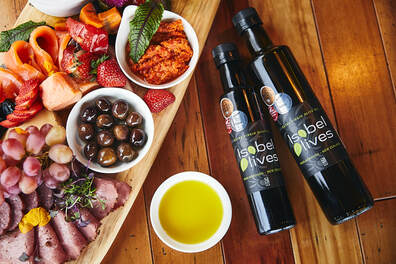|
Good quality olive oil has a peppery bite, a mildly bitter aftertaste and can make salad sing when married to balsamic vinegar. The unique taste of olive oil is due to the presence of polyphenols.
Polyphenols are naturally occurring compounds found in plant based foods, including tea, cocoa, vegetables, fruits, and olive oil. Some polyphenols work as antioxidants, which means they neutralize harmful free radicals that potentially damage the body's cells, leading to conditions like heart disease, cancer, and cognitive decline. Studies show that polyphenols help fight inflammation and may help lower the risk of several diseases such as heart disease, some types of cancer, and Alzheimers. Olive oil contains at least 30 different pheolic compounds including oleacein, tyrosol and hydroxytyrosol. By definition, high phenolic olive oil contains at least 250 mg polyphenols per kilogram of oil. So, not all olive oils are high in polyphenols -- it depends how the oils are processed and stored. In Europe, bottles of high-polyphenol olive oil can bear the health claim "olive oil polyphenols contribute to the protection of blood lipids from oxidative stress" as long as it contains at least 5 mg of hydroxytyrosol and its derivatives per 20 g of olive oil. There is no similar health claim in NZ, but of course the health benefits would be the same. One well-known benefit of olive oil is its high proportion of monounsaturated fat, which has been linked to a reduced risk of heart disease and stroke. Olive oil is about 98 percent fat, but that remaining two percent is made up of polyphenols and other minor constituents that lend to olive oil's health benefits. Many studies have looked at the health benefits of good-quality, high-polyphenol olive oil in conjunction with the Mediterranean diet. That's an eating plan that includes lots of vegetables and fruit, cuts back on meat and sweets, and relies on olive oil as the main source of dietary fat. Studies show that regularly using extra virgin olive oil as part of the Mediterranean diet is associated with a reduced risk of developing several diseases -- including heart disease, type 2 diabetes, and some types of cancer. A recent review of 26 studies comparing the beneficial effects of low- vs. high-polyphenol olive oil found that the high-polyphenol oil was superior for protecting heart health, blood pressure and inflammation. But here's the thing -- not all olive oils are high in polyphenols. Some bottles will we labelled with phenolic content, but that's a rare find outside Europe or specialty olive oil shops. If the bottle is labelled, look for one with a phenolic content of 250 mg/kg or more. Like fine wine, high-polyphenol olive oil is expensive -- starting at about $30 per 500 mL bottle. So, that $10 bottle of grocery store olive oil is not going to be high in polyphenols. If you cannot find olive oil that's labelled with phenolic content, here are some tips for sourcing high-polyphenol olive oil from reputable dealers:
Once home, keep the olive oil bottle away from heat and light. Store it away from the stove top, preferably in a cool, dark spot -- and yes, you can keep olive oil in the fridge. Once the bottle of olive oil is opened, consume it within a few months. And yes, you can cook with Extra Virgin Olive Oil at medium stove-top heat without destroying the polyphenols. Check out Busting the Myth and Video that explains this.
3 Comments
|
AuthorChris Piper Archives
June 2024
Categories |


 RSS Feed
RSS Feed